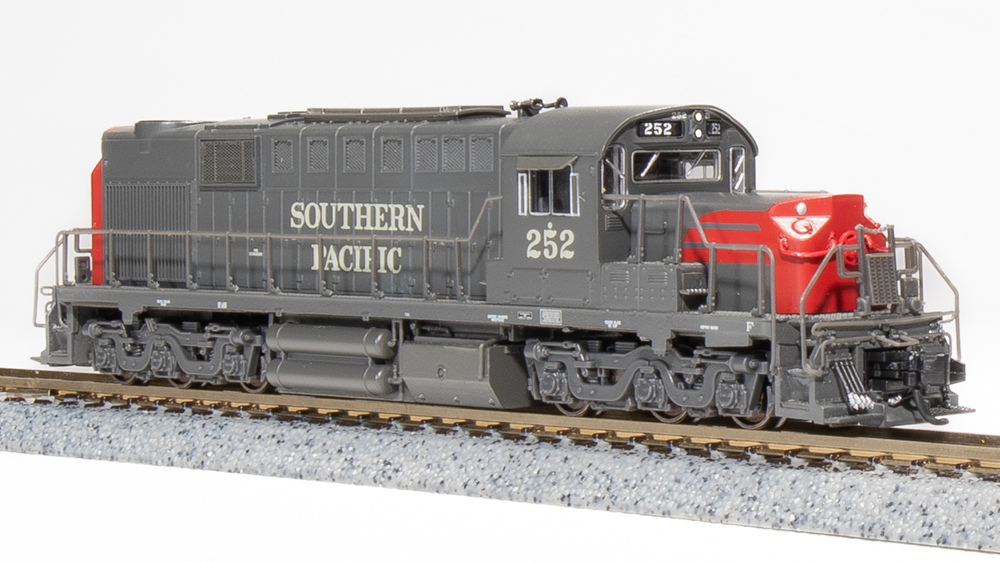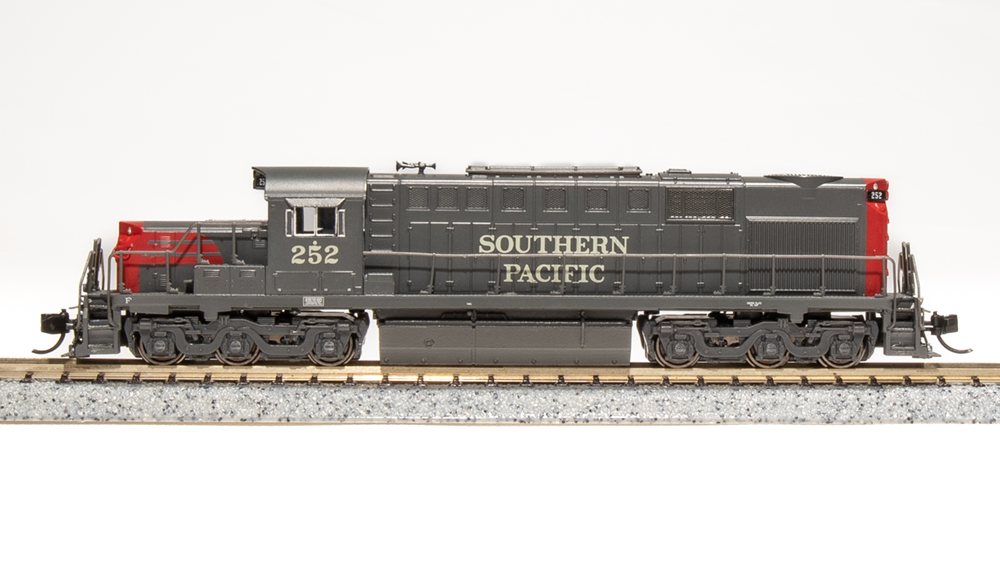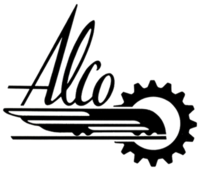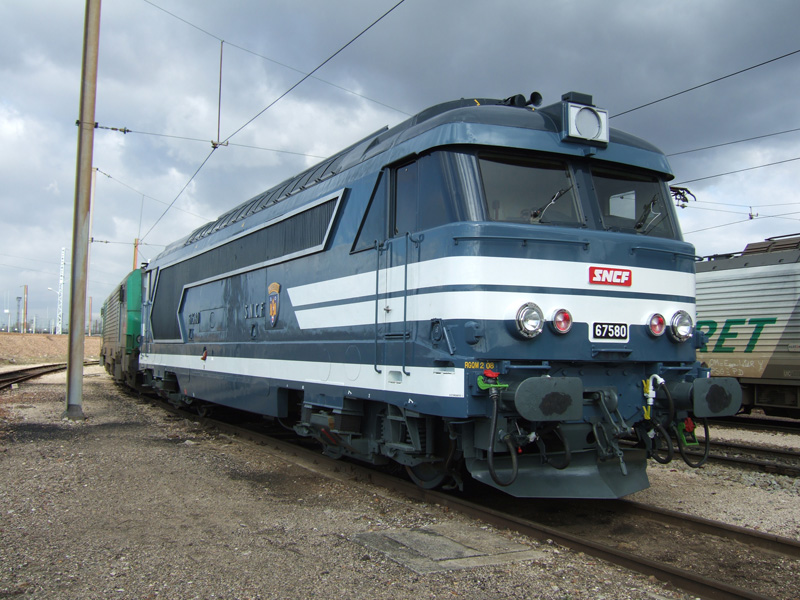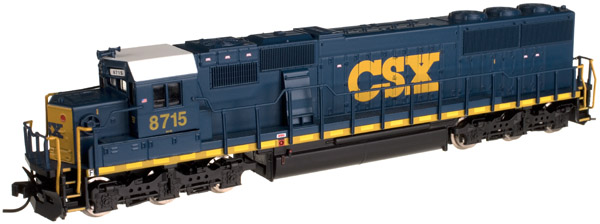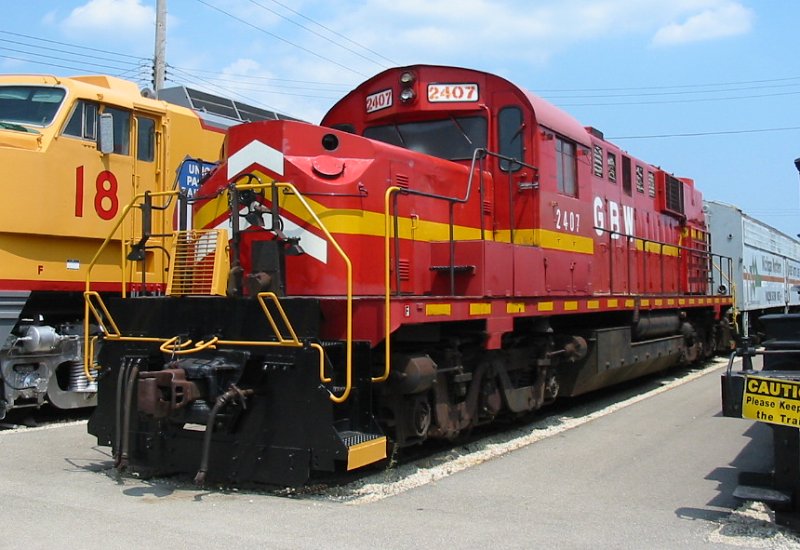Model Information: First released in 2022, BLI are offering models of the RSD-15's in N scale with DCC & Sound for the first time. BLI are offering models of RSD-15's from 9 railroads in 10 distinct paint schemes. All road numbers and paint schemes are prototypically accurate. They are also building three models that were very similar in real life - two C&O RSD-7's and a CP RSD-17. The models will be BLI RSD-15 models with the C&O and CP paint schemes applied. There wasn't a lot of detail variation among the RSD-15's, and they were making three distinct models - a standard low-hood model, a standard high-hood model, and a PRR-type high hood model with different locations for the bell and horns.
Independently controllable lights in each RSD-15 model:
Independently controllable lights in each RSD-15 model:
- Headlight
- Rear Light
- Cab Light
- Front & Rear Numberboards
- Integral Dual-Mode Decoder with Back EMF for Superb Slow Speed Operation in DC and DCC
- Precision Drive Mechanism Engineered for Heavy Towing and Smooth Slow Speed Operation
- All Wheel Electrical Pick-up
- ABS Body with Die Cast Chassis for Maximum Tractive Effort
- Premium Caliber Painting
- Prototypically Accurate Paint Schemes and Road Numbers
- Many Separately Applied Details such as Handrails, Grab Irons, Horns, Bell, and Antenna
- Prototypical Light Operation
- MicroTrains-compatible couplers (2)
- Will Operate on Code 55, Code 70, and Code 80 Rail
- Minimum Operating Radius: 9 inches
DCC Information:
Paragon4 Sound and Control System:
Paragon4 Sound and Control System:
- Prototypically Accurate Sounds for the Alco RSD-15 Diesel Locomotive
- Operates in DC & DCC with improved DC speed control (use DCMaster for DC Sound)
- Built-In extra capacitance to navigate imperfect track
- Pro Lighting Mode offers individual control of all lights on model
- Switcher Mode for precise low speed control
- Record & Play Operation - Records and plays back sounds and movements once or repeatedly for automatic operation
- High Resolution Audio
- Quillable Horn for various whistle lengths and patterns
- Choice of 3 selectable Horns
- Alternate Whistle / Horn where applicable for locomotive with air horn and steam whistle - both the main whistle and alternate can be easily played
- Adjustable bell ringing interval for faster or slower bell
- Numerous user-mappable functions with available keys
- Multiple realistic passenger and crew sounds play on command
- Grade Crossing Automatic Signal
- Automatic Forward / Reverse Signal
- Prime Mover sound intensity varies with load
- Individually adjustable sound volumes for each effect
- EZ Reset Button for quick return to factory default settings
Prototype History: The ALCO RSD-15 was a diesel-electric locomotive of the road switcher type built by ALCO (the American Locomotive Company) of Schenectady, New York between August 1956 and June 1960, during which time 75 locomotives were produced. The RSD-15 was powered by an ALCO 251 16-cylinder four-cycle V-type prime mover rated at 2,400 horsepower (1.79 MW); it superseded the almost identical ALCO 244-engined RSD-7, and was catalogued alongside the similar but smaller 1,800 hp (1.34 MW) RSD-12, powered by a 12-cylinder 251-model V-type diesel engine.
A single example of the very similar model RSD-17 was built by the Montreal Locomotive Works in 1957 and purchased by the Canadian Pacific (as #8921).
The locomotive rode on a pair of three-axle Trimount trucks, in an AAR C-C wheel arrangement, with all axles powered by General Electric model 752 traction motors. These trucks have an asymmetrical axle spacing because of the positioning of the traction motors. The six-motor design allowed higher tractive effort at lower speeds than an otherwise similar four-motor design. The RSD-15 could be ordered with either a high or low short hood; railfans dubbed the low short hood version "Alligators", on account of their unusually long low noses.
From Wikipedia
A single example of the very similar model RSD-17 was built by the Montreal Locomotive Works in 1957 and purchased by the Canadian Pacific (as #8921).
The locomotive rode on a pair of three-axle Trimount trucks, in an AAR C-C wheel arrangement, with all axles powered by General Electric model 752 traction motors. These trucks have an asymmetrical axle spacing because of the positioning of the traction motors. The six-motor design allowed higher tractive effort at lower speeds than an otherwise similar four-motor design. The RSD-15 could be ordered with either a high or low short hood; railfans dubbed the low short hood version "Alligators", on account of their unusually long low noses.
From Wikipedia
Road Name History: 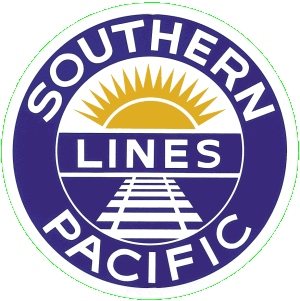 The Southern Pacific Transportation Company (reporting mark SP), earlier Southern Pacific Railroad and Southern Pacific Company, and usually called the Southern Pacific or (from the railroad's initials) Espee, was an American Class I railroad. It was absorbed in 1988 by the company that controlled the Denver and Rio Grande Western Railroad and eight years later became part of the Union Pacific Railroad.
The Southern Pacific Transportation Company (reporting mark SP), earlier Southern Pacific Railroad and Southern Pacific Company, and usually called the Southern Pacific or (from the railroad's initials) Espee, was an American Class I railroad. It was absorbed in 1988 by the company that controlled the Denver and Rio Grande Western Railroad and eight years later became part of the Union Pacific Railroad.
The railroad was founded as a land holding company in 1865, later acquiring the Central Pacific Railroad by lease. By 1900 the Southern Pacific Company was a major railroad system incorporating many smaller companies, such as the Texas and New Orleans Railroad and Morgan's Louisiana and Texas Railroad. It extended from New Orleans through Texas to El Paso, across New Mexico and through Tucson, to Los Angeles, through most of California, including San Francisco and Sacramento. Central Pacific lines extended east across Nevada to Ogden, Utah, and reached north through Oregon to Portland. Other subsidiaries eventually included the St. Louis Southwestern Railway (Cotton Belt), the Northwestern Pacific Railroad at 328 miles (528 km), the 1,331 miles (2,142 km) Southern Pacific Railroad of Mexico, and a variety of 3 ft (914 mm) narrow gauge routes.
In 1929 SP/T&NO operated 13848 route-miles not including Cotton Belt, whose purchase of the Golden State Route circa 1980 nearly doubled its size to 3,085 miles (4,965 km), bringing total SP/SSW mileage to around 13,508 miles (21,739 km).
By the 1980s route mileage had dropped to 10,423 miles (16,774 km), mainly due to the pruning of branch lines. In 1988 the Southern Pacific was taken over by D&RGW parent Rio Grande Industries. The combined railroad kept the Southern Pacific name due to its brand recognition in the railroad industry and with customers of both constituent railroads. Along with the addition of the SPCSL Corporation route from Chicago to St. Louis, the total length of the D&RGW/SP/SSW system was 15,959 miles (25,684 km).
By 1996 years of financial problems had dropped SP's mileage to 13,715 miles (22,072 km), and it was taken over by the Union Pacific Railroad.
Read more on Wikipedia.

The railroad was founded as a land holding company in 1865, later acquiring the Central Pacific Railroad by lease. By 1900 the Southern Pacific Company was a major railroad system incorporating many smaller companies, such as the Texas and New Orleans Railroad and Morgan's Louisiana and Texas Railroad. It extended from New Orleans through Texas to El Paso, across New Mexico and through Tucson, to Los Angeles, through most of California, including San Francisco and Sacramento. Central Pacific lines extended east across Nevada to Ogden, Utah, and reached north through Oregon to Portland. Other subsidiaries eventually included the St. Louis Southwestern Railway (Cotton Belt), the Northwestern Pacific Railroad at 328 miles (528 km), the 1,331 miles (2,142 km) Southern Pacific Railroad of Mexico, and a variety of 3 ft (914 mm) narrow gauge routes.
In 1929 SP/T&NO operated 13848 route-miles not including Cotton Belt, whose purchase of the Golden State Route circa 1980 nearly doubled its size to 3,085 miles (4,965 km), bringing total SP/SSW mileage to around 13,508 miles (21,739 km).
By the 1980s route mileage had dropped to 10,423 miles (16,774 km), mainly due to the pruning of branch lines. In 1988 the Southern Pacific was taken over by D&RGW parent Rio Grande Industries. The combined railroad kept the Southern Pacific name due to its brand recognition in the railroad industry and with customers of both constituent railroads. Along with the addition of the SPCSL Corporation route from Chicago to St. Louis, the total length of the D&RGW/SP/SSW system was 15,959 miles (25,684 km).
By 1996 years of financial problems had dropped SP's mileage to 13,715 miles (22,072 km), and it was taken over by the Union Pacific Railroad.
Read more on Wikipedia.
Brand/Importer Information: 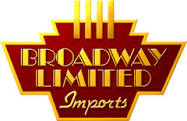 Broadway Limited Imports, LLC defines itself as "the world's foremost producer of top-quality HO and N scale model trains".
Broadway Limited Imports, LLC defines itself as "the world's foremost producer of top-quality HO and N scale model trains".
The company was founded in 2002 and introduced its first N scale model in 2009.
Broadway Limited Imports is composed of a team of 15 fun loving individuals who are dedicated to creating the most realistic model railroading experience possible, with the best customer service possible.
The Broadway Limited Imports headquarters is located in Ormond Beach, Florida at 9 East Tower Circle. It's just under an hour's drive from Disney World.
About Broadway Limited Imports.

The company was founded in 2002 and introduced its first N scale model in 2009.
Broadway Limited Imports is composed of a team of 15 fun loving individuals who are dedicated to creating the most realistic model railroading experience possible, with the best customer service possible.
The Broadway Limited Imports headquarters is located in Ormond Beach, Florida at 9 East Tower Circle. It's just under an hour's drive from Disney World.
About Broadway Limited Imports.
Item created by: CNW400 on 2022-02-23 14:37:03
Last edited by: Alain LM on 2022-12-31 13:06:48
If you see errors or missing data in this entry, please feel free to log in and edit it. Anyone with a Gmail account can log in instantly.
Last edited by: Alain LM on 2022-12-31 13:06:48
If you see errors or missing data in this entry, please feel free to log in and edit it. Anyone with a Gmail account can log in instantly.


